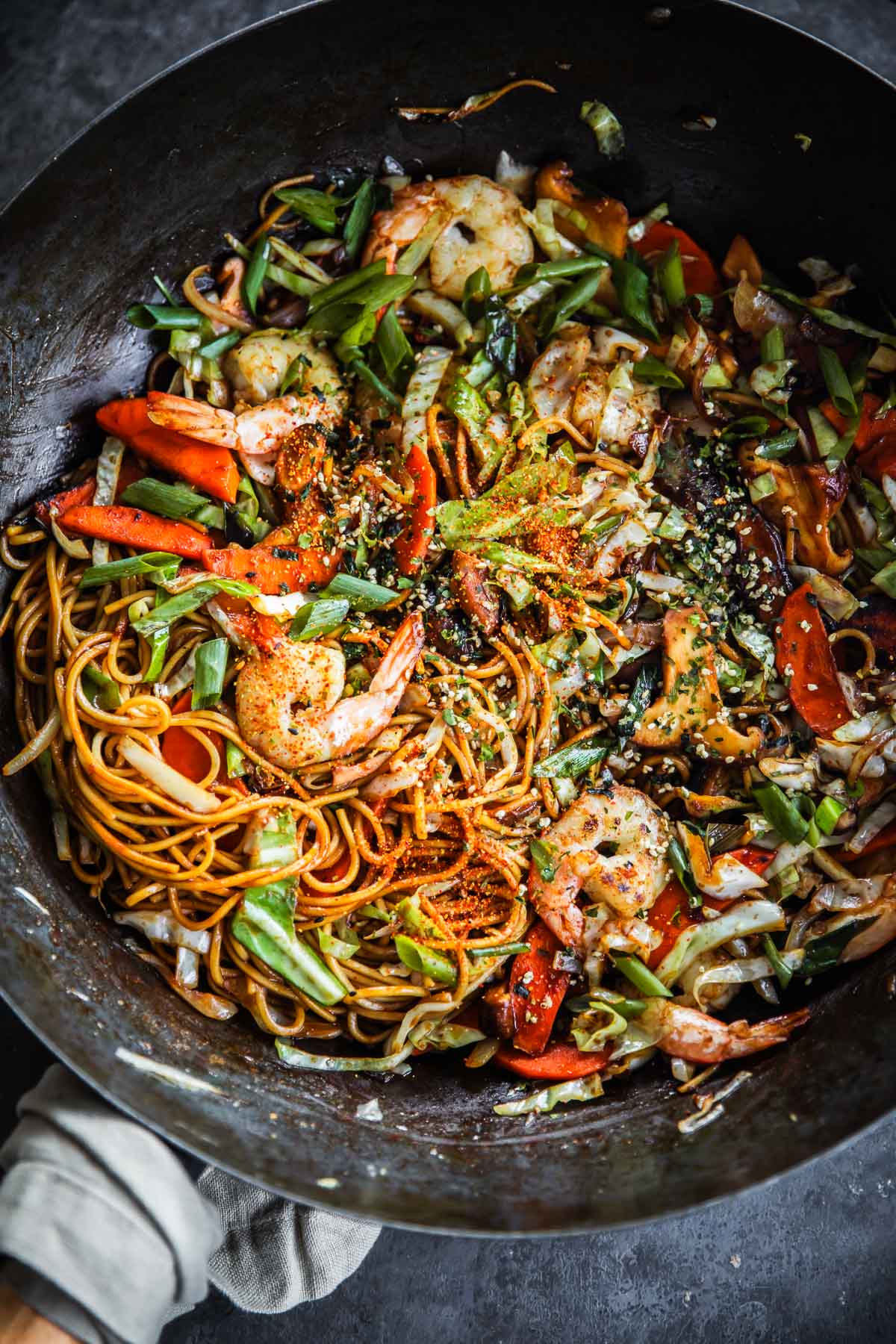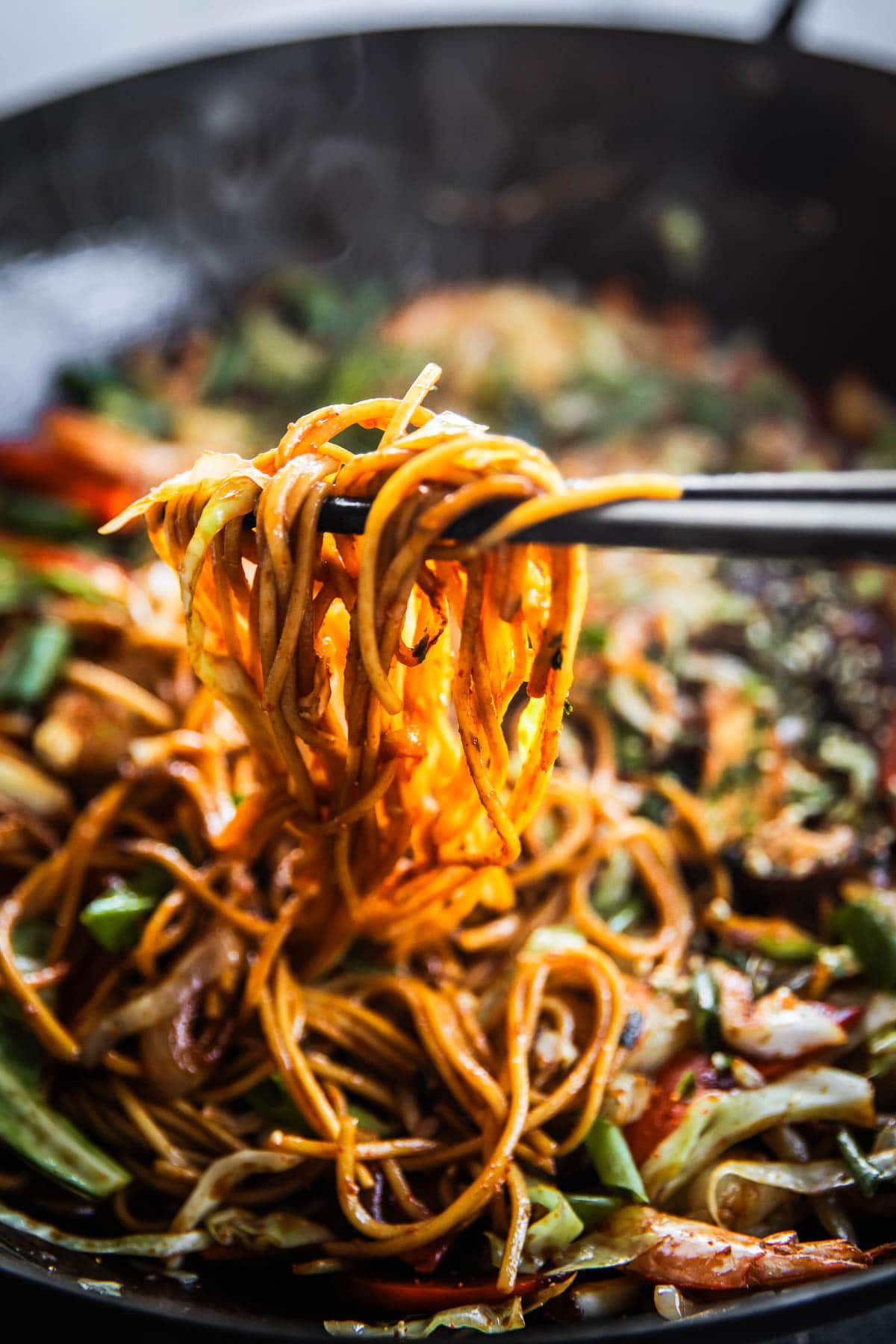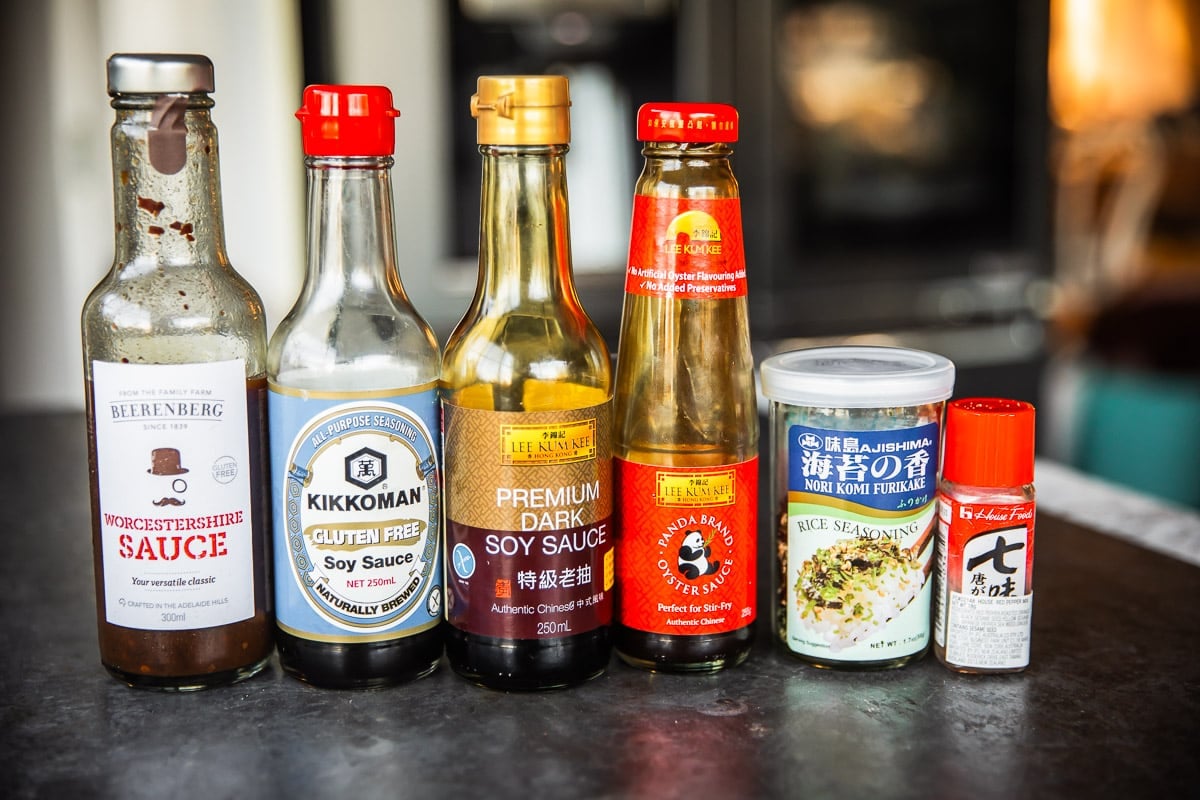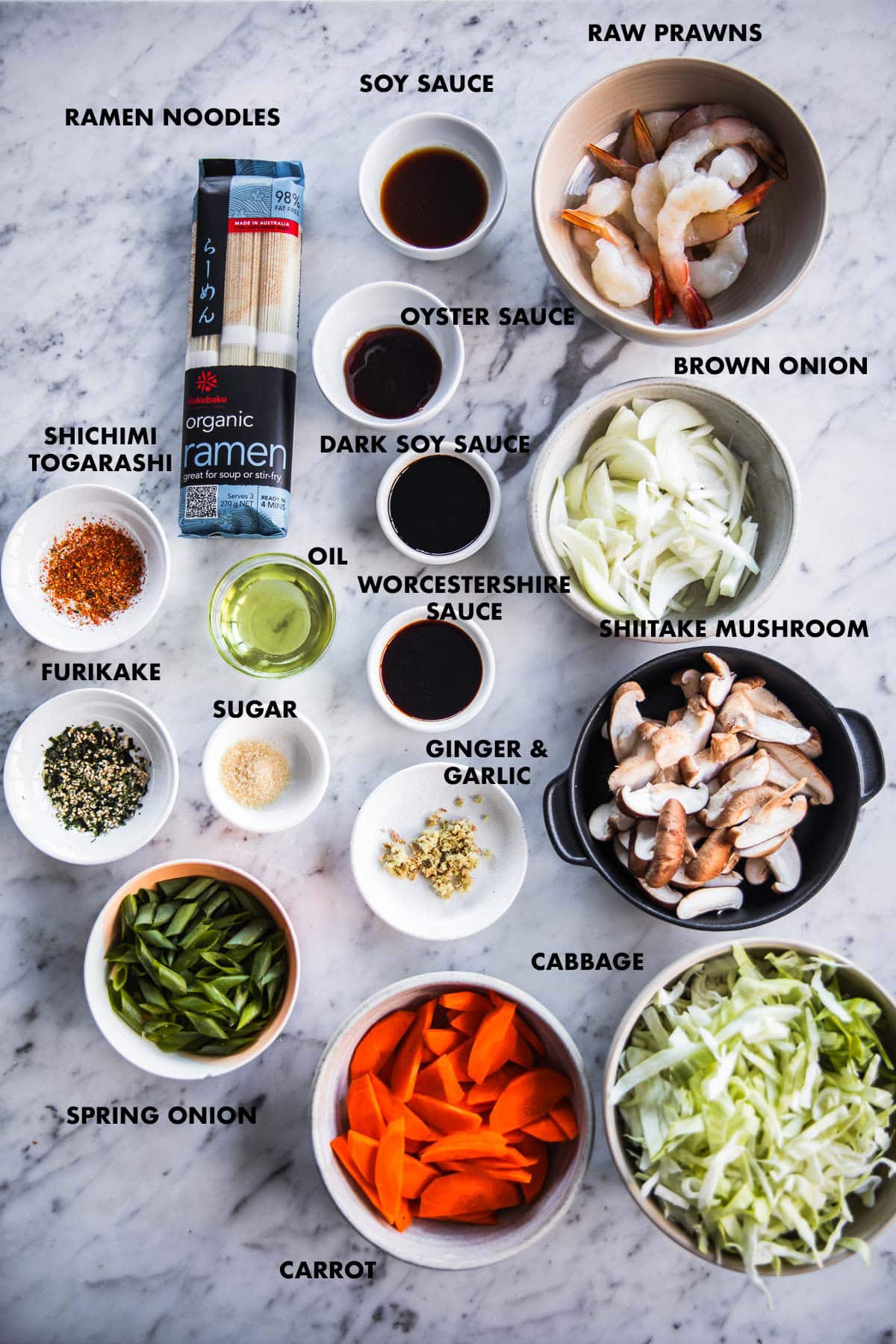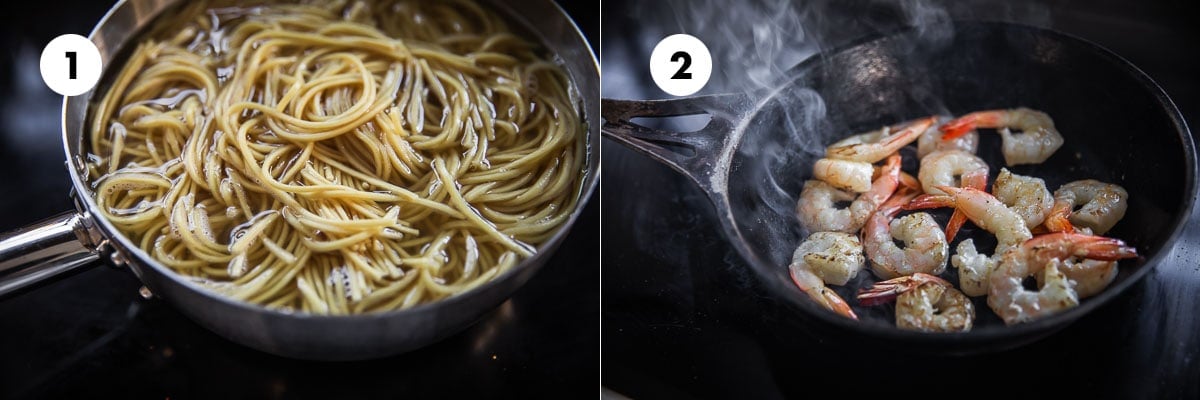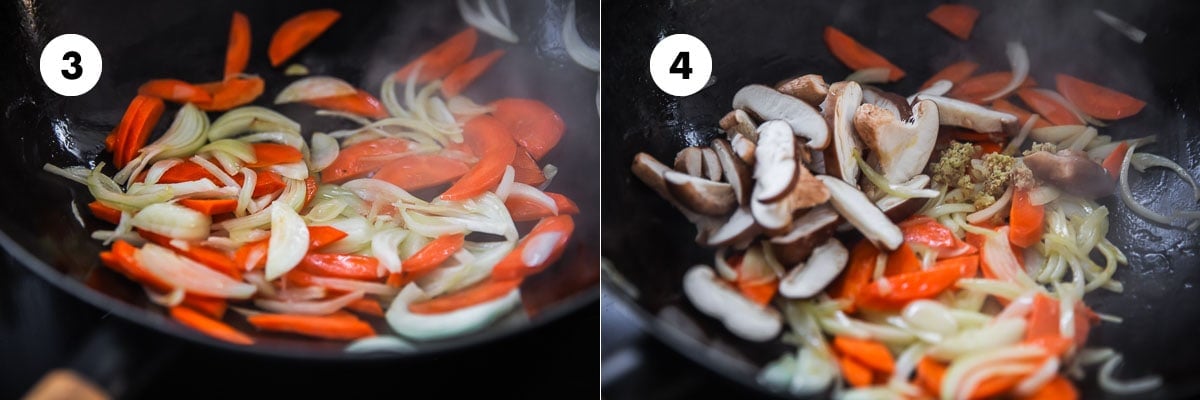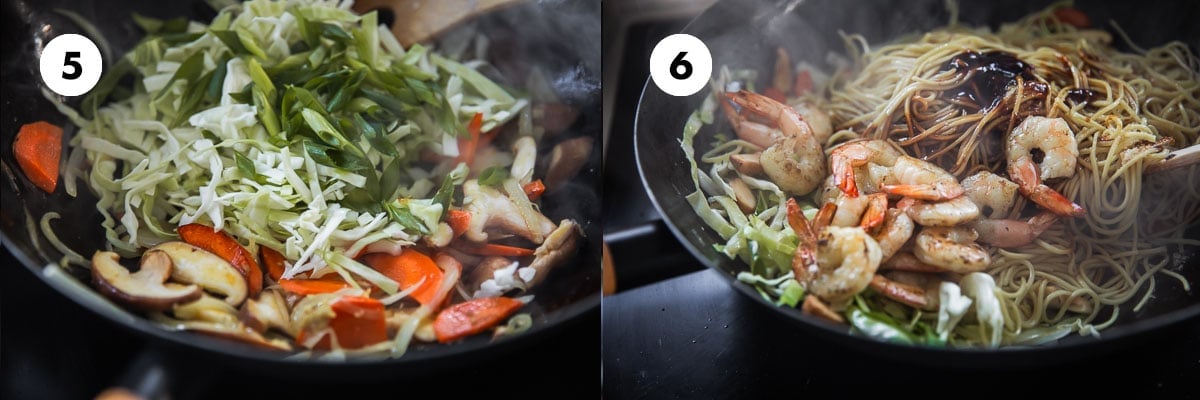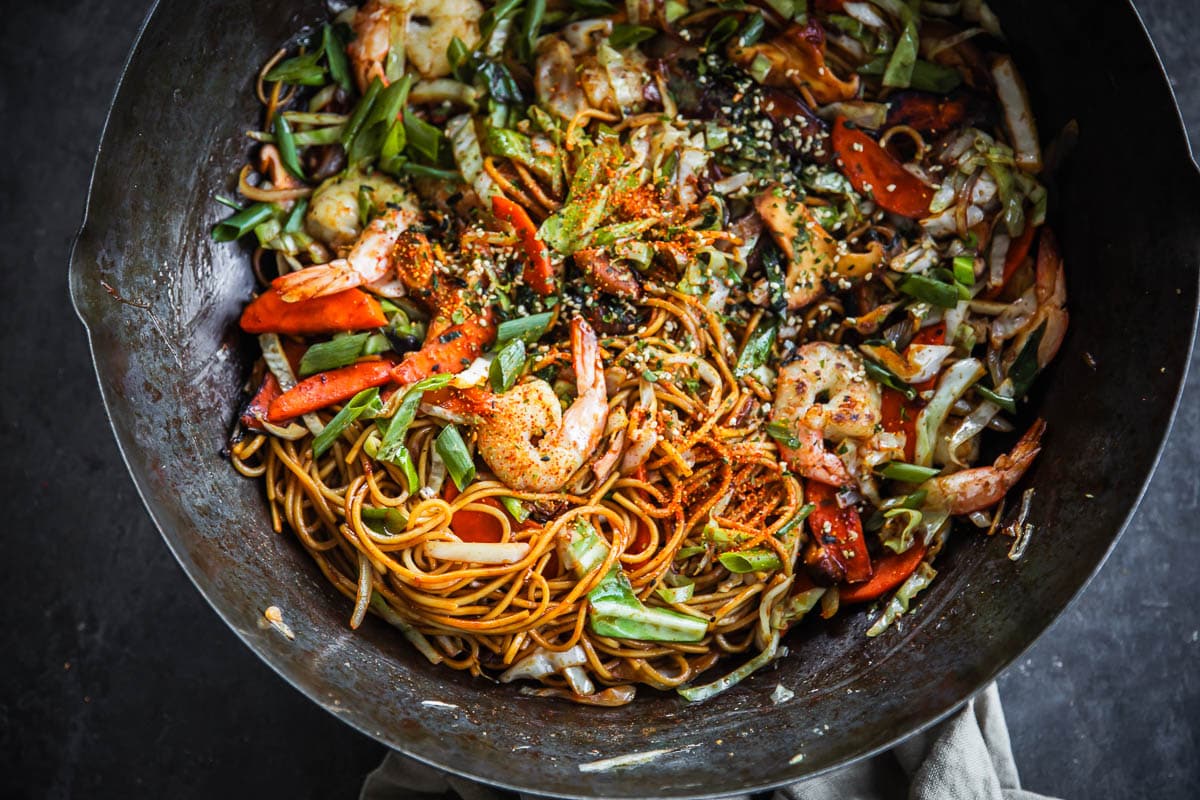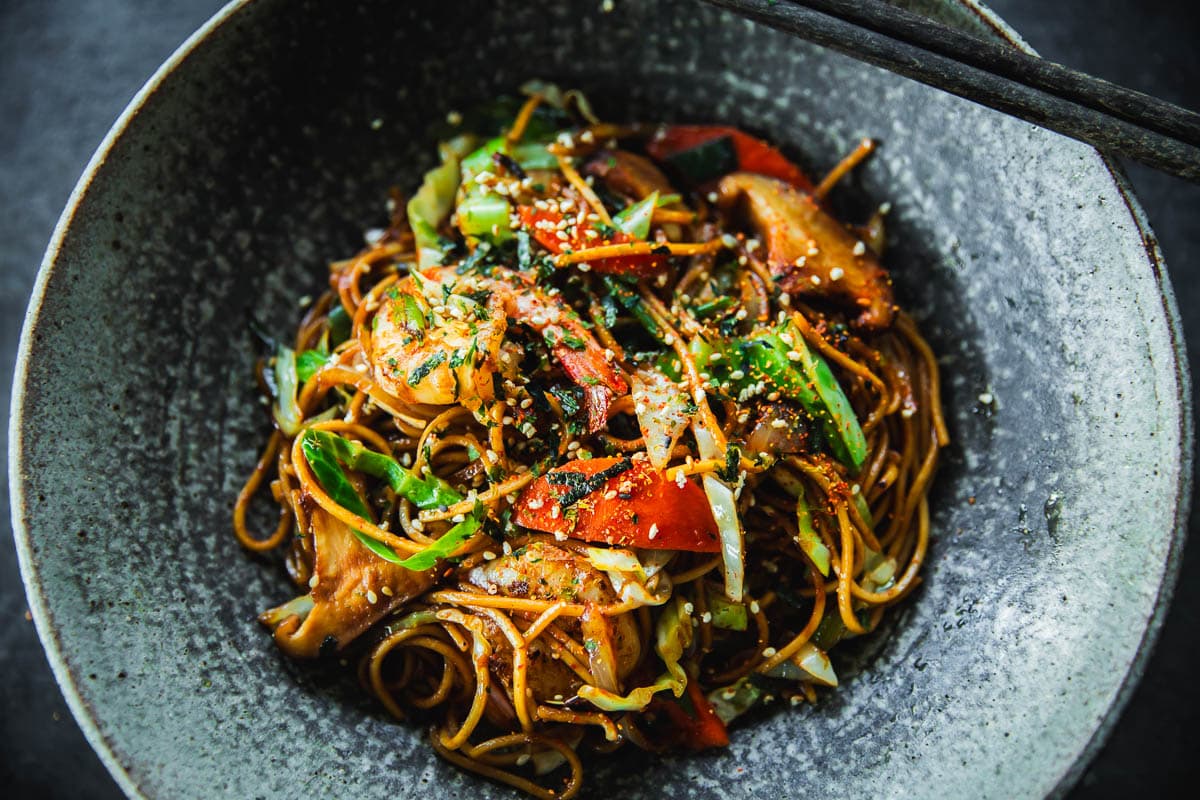This Prawn Yakisoba is a copycat version of the super popular Yakisoba served at my local Japanese restaurant “Sushi Mee” on Sydney’s north shore. It tastes just like the real deal, delicious stir-fried noodles with juicy prawns and veggies, tossed in the most delicious homemade Yakisoba sauce. Ready in just 20 minutes!
Jump to:
What is Yakisoba?
Yakisoba is a Japanese stir-fried noodle dish – “yaki” meaning fried or grilled and “soba” meaning noodles. Typically, yakisoba is made with ramen-style wheat noodles stir-fried with vegetables like cabbage, mushroom, carrot and onion and a sweet and sour Worcestershire-like Yakisoba soba sauce. Often pork, chicken or prawns are added for the protein. The noodles are topped with “anori” (seaweed powder) and often served with pickled ginger on the side and topped with Japanese mayonnaise.
Although soba noodles are traditionally made with buckwheat, the “soba” in yakisoba refers to Chinese-style thin wheat noodles. Yakisoba is found all over Japan and around the world. It is a quick, delicious and light meal.
Easy homemade Prawn Yakisoba
Yakisoba is very different from other noodle dishes like Pad Thai or Pad See Ew mainly due to its unique sweet and sour sauce. Made with an unusual combination of ingredients, Yakisoba sauce gives these noodles that delicious, edgy, smoky, street-style flavour. The sauce only has 5 main ingredients
- Worcestershire Sauce
- Light Soy Sauce
- Dark Soy Sauce
- Oyster Sauce
- Sugar
And finally, to elevate that distinct Japanese flavour in this Prawn Yakisoba, one can add anori (seaweed powder) which can be a tad hard to source. So I use a combination of Shichimi Togarashi (Japanese spicy seasoning) and Nori Furikake (a Japanese rice seasoning with dried crumbled seaweed and sesame seeds).
Ingredients & Substitutions
This is what you will need to make a wok full of the most delicious Prawn Yakisoba you have ever eaten
- Prawns – Make sure you use raw prawn meat (with or without the tails attached). It requires only a few minutes of cooking time and is tender, juicy and succulent in the noodles. If you buy pre-cooked prawns, they will become tough on stir-frying. You can substitute with firm white fish like snapper, hoki, ling or perch and follow the same cooking instructions as for the prawns.
- Noodles – Thin wheat noodles are traditionally used to make yakisoba. Ramen noodles work perfectly in this recipe. A lot of Japanese grocery stores carry pre-cooked noodles in a pouch labeled “Yakisoba Noodles”. I prefer cooking noodles with raw noodles as it creates a fantastic final dish that is not soggy and just like the ones at the restaurants. If you can’t find ramen noodles, udon noodles or Chinese Chow mein noodles are a good substitute.
- Onion – Use brown onion for this recipe. Can be substituted with red onion.
- Mushroom – Shiitake mushrooms are the authentic choice for this recipe. They can be substituted with brown mushrooms.
- Cabbage – Use green cabbage for this recipe.
- Carrot – I have eaten versions of these noodles with both carrot and sweet potato. Both of these vegetables are fantastic in this stir-fry and add a touch of colour and sweetness.
- Spring Onion, ginger, garlic – Use fresh (not paste) and chop, grate and mince as required.
- Soy Sauce – Use light soy sauce for this recipe. This adds saltiness.
- Dark Soy Sauce – This adds colour, extra saltiness and viscosity. This is a thicker, syrupy soy sauce.
- Oyster Sauce – This adds a sweet and sour seafood taste to the recipe. Can be substituted with Vegetarian oyster sauce.
- Worcestershire Sauce – This is a sweet and sour sauce packed with loads of umami and often found along with barbecue sauce in the supermarket. It is what gives Yakisoba noodles that distinct flavour. This cannot be substituted with anything else as it is vital to the taste of the recipe.
- Shichimi Togarashi – This is a spicy Japanese seasoning made of red pepper, roasted orange peel, black sesame seed, white sesame seed, Japanese pepper, seaweed and ginger. It has a beautiful complex flavour. If you can’t find it, substitute it with red chilli flakes or Gochugaru and some sesame seeds.
- Nori Furikake – A Japanese rice seasoning made with crushed nori, sesame seeds, sugar and salt. If you can’t find it, crush roasted nori seeds and sprinkle that as a garnish.
How to make Prawn Yakisoba?
- Cook ramen noodles according to packet instructions. Rinse in cold water and set aside.
- Sear prawns for a couple of minutes in a hot, dry, frying pan with a drizzle of oil until smoking and just cooked. Remove from heat.
3. Stir-fry onion and carrot in oil in a hot wok for a few minutes.
4. Add mushroom and ginger and stir-fry for another minute.
5. Add cabbage and spring onion. Stir-fry for 30 seconds until veggies are glazed.
6. Add cooked noodles, prawns and sauce. Stir-fry and toss to mix well. Cook for 4-5 minutes until prawns are cooked.
Garnish Prawn Yakisoba with Furikake, Shichimi Togarashi. Serve immediately.
Serving Suggestions and Storage
Cooked noodles will keep fresh in the fridge in a glass air-tight container for up to 2 days. Freezing yakisoba is not recommended.
More Asian Noodle Recipes
Recipe
Hungry For More Recipes? Subscribe to my newsletter. Check out Facebook, Instagram and Pinterest to see everything I share! And if you love cooking and new cookbooks, join my free Cooking Club on Facebook!
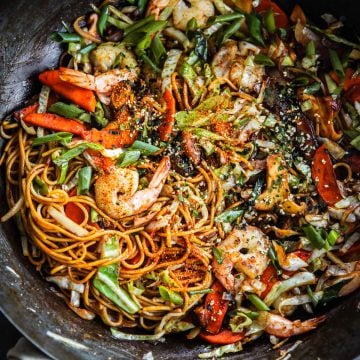
-
Cook ramen noodles as per the packet instructions. Rinse and drain to cool down noodles after cooking. Add a bit of water to the noodles in the pan and set aside so they don’t dry out.
-
Heat a small cast iron pan on high and add the prawn meat to the pan alongwith one teaspoon of oil. Toss and cook them for a minute until the prawns start turning opaque. Remove from the heat.
-
Make the Yakisoba sauce by mixing soy sauce, dark soy sauce, oyster sauce, Worcestershire sauce and sugar in a bowl.
-
Heat oil in a large wok on high.
-
Add onion and carrot. Cook for 2-3 until the veggies are glossy.
-
Add ginger, garlic and mushroom. Cook for a minute until mushrooms are glazed.
-
Add cabbage and spring onion. Cook for 30 seconds until greens are glossy.
-
Drain noodles and add to the wok along with cooked prawns and Yakisoba sauce. Toss and mix to coat everything evenly with the sauce. Cook for 4-5 minutes until prawns are cooked through and everything is heated.
-
Remove from heat. Sprinkle with Shichimi Togarashi and Furikake. Serve immediately.
- Tablespoon & Cup Measurements – I use Australian cup and spoon measurements. In my recipes 1 tablespoon = 20ml and 1 cup = 250ml.
- Prawns – Make sure you use raw prawn meat (with or without the tails attached). It requires only a few minutes of cooking time and is tender, juicy and succulent in the noodles. If you buy pre-cooked prawns, they will become tough on stir-frying. You can substitute with firm white fish like snapper, hoki, ling or perch and follow the same cooking instructions as for the prawns.
- Noodles – Thin wheat noodles are traditionally used to make yakisoba. Ramen noodles work perfectly in this recipe. A lot of Japanese grocery stores carry pre-cooked noodles in a pouch labelled “Yakisoba Noodles”. I prefer cooking noodles with raw noodles as it creates a fantastic final dish that is not soggy and just like the ones at the restaurants. If you can’t find ramen noodles, udon noodles or Chinese Chow mein noodles are a good substitute.
- Soy Sauce – Use light soy sauce and dark soy sauce for this recipe. Dark soy sauce is a thicker, syrupy soy sauce. This adds saltiness and colour.
- Oyster Sauce – This adds a sweet and sour seafood taste to the recipe. Can be substituted with Vegetarian oyster sauce.
- Worcestershire Sauce – This is a sweet and sour sauce packed with loads of umami and often found along with barbecue sauce in the supermarket. It is what gives Yakisoba noodles that distinct flavour. This cannot be substituted with anything else as it is vital to the taste of the recipe.
- Shichimi Togarashi – This is a spicy Japanese seasoning made of red pepper, roasted orange peel, black sesame seed, white sesame seed, Japanese pepper, seaweed and ginger. It has a beautiful complex flavour. If you can’t find it, substitute it with red chilli flakes or Gochugaru and some sesame seeds.
- Nori Furikake – A Japanese rice seasoning made with crushed nori, sesame seeds, sugar and salt. If you can’t find it, crush roasted nori seeds and sprinkle that as a garnish.
- Storage – Cooked Yakisoba noodles will stay fresh in the fridge in an air-tight container for up to 2 days.
- Make It vegetarian – Substitute prawn meat with a cup of thinly sliced sweet potato. Cook them along with the carrot and onion in step 5. Substitute oyster sauce with Vegetarian oyster sauce.
Calories: 464kcal | Carbohydrates: 58g | Protein: 18g | Fat: 19g | Saturated Fat: 6g | Polyunsaturated Fat: 3g | Monounsaturated Fat: 9g | Trans Fat: 0.03g | Cholesterol: 63mg | Sodium: 2414mg | Potassium: 627mg | Fiber: 6g | Sugar: 7g | Vitamin A: 3496IU | Vitamin C: 18mg | Calcium: 96mg | Iron: 4mg

